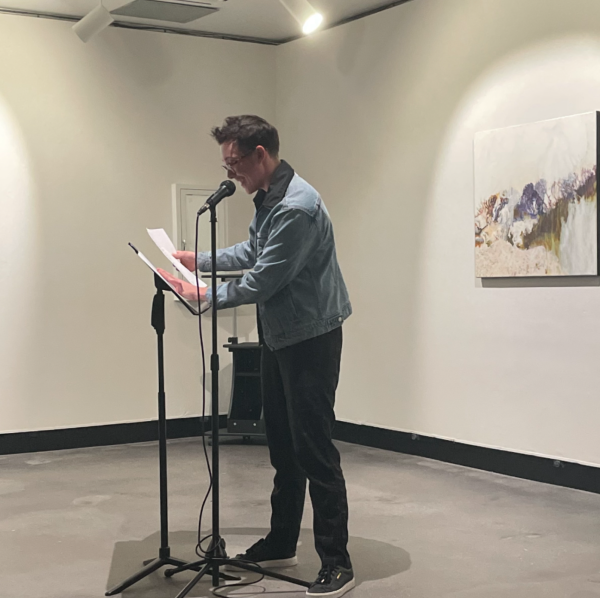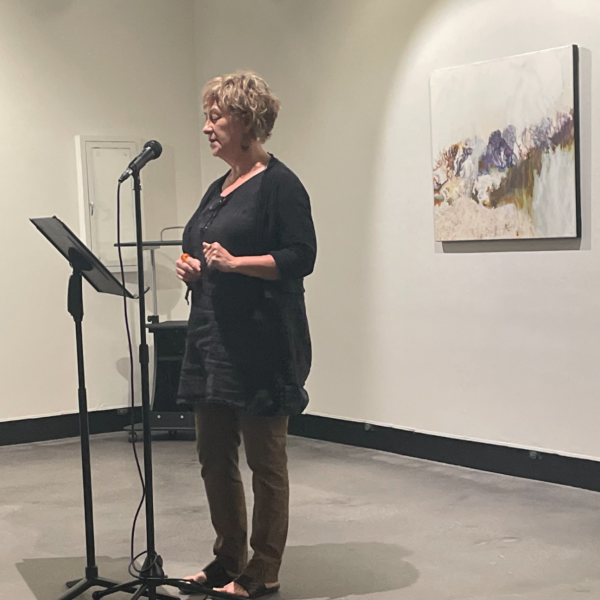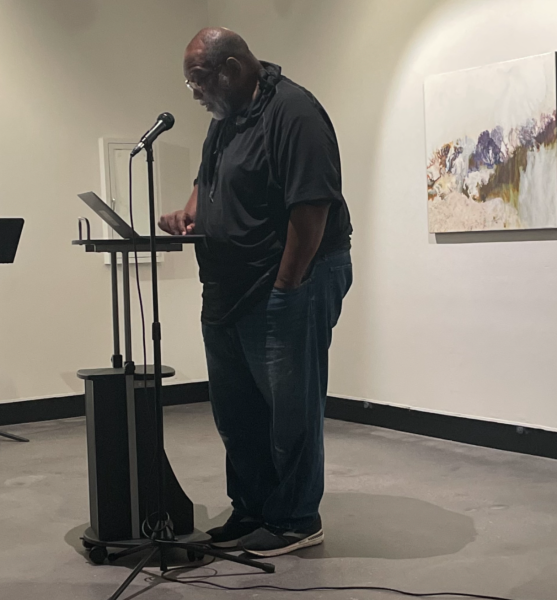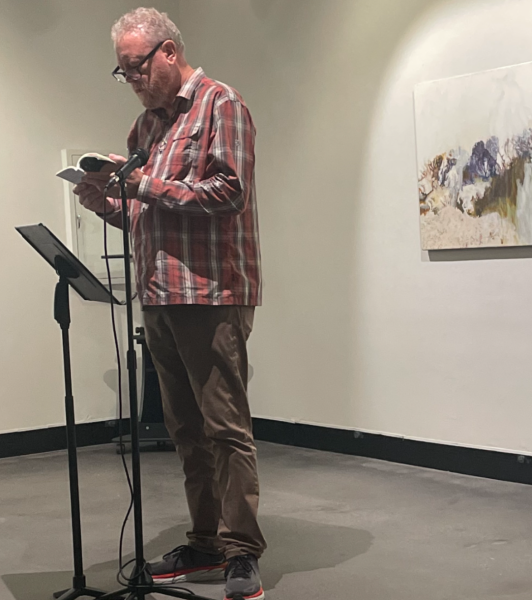Footsteps reverberate across the concrete floors in the Hanes Art Gallery. Whispered voices ascend the staircase, and people of all ages and backgrounds begin to take their seats. Beside me, someone’s mom texted them a GIF of a man dancing with the words “You got this” spelled out along the bottom. Here…is where poetry lives.
The Wake Forest Department of English, in conjunction with the Interdisciplinary Arts Center, hosted a two-part poetry event from Sept. 13-14. The event was part of a larger series dedicated to bringing writers and other creatives to campus, the Dillon Johnston Writers Reading Series, which has hosted artists such as Kiik Araki-Kawaguchi, Charles Bernstein and John Yau.
The Sept. 13 event was a poetic performance entitled “Variations in the Dream of X,” followed on Sept. 14 by a poetry reading event featuring four different performers — Ken Taylor, Dr. Fred Moten, Lynn Book and Vic Leon.

Story continues below advertisement
The Sept. 14 poetry reading was hosted in the Hanes Art Gallery. Vic Leon, a drag king out of Louisville, Ky., kicked off the night.
Several of his poems focused on gender identity and the art of understanding oneself. He says that his work, both in the drag scene and in his writing, is inspired primarily by music.
“[Drag is] acting in lots of ways,” Leon said. “I try to emulate the feeling in the music and bring it to life on stage.”
For his poetry, the music is what guides him through the writing process.
“The imagery and feeling I get from listening allows me to translate my thoughts and emotions into poetry,” Leon said. “I like to mull over an idea I have and listen to music that I can identify with. The melodic mood and tone [are] comforting and guiding, and I try to put it on paper.”
Dr. Lynn Book, the former director of the program for creativity and innovation at Wake Forest, presented some of her work at the poetry reading, as well. The trans-media artist put on quite the show — blurring the line between poetry and theater.

This is a concept that Book taught to her students during her time at Wake Forest. She views creativity as a cross-discipline subject — one that can be found in every department.
“Within the classroom, the sociology [student] is sitting next to the student from biology…next to [an] English student…an art history student…a business and enterprise management [student]…[a communication] student, and so on,” Book said. “So how in the heck do you find common ground there? Creativity.”
A poem of Book’s that particularly struck me was “Scenes from an Unfinished Film” — which is actually based on one of her unfinished video projects.
“I’ve really been working on this video for a long time, and I’ve done tons of writing — there’s hundreds of hours of footage,” Book said. “So I thought ‘Okay, this notion of scenes seems like a really wonderful way to poetically frame some of the language [and] shots.”
Book wasn’t the only notable figure of higher education present at the event. Moten, a professor at New York University in the departments of performance studies and comparative literature, presented several poems.
Moten teaches courses on Black studies, poetics and critical theory, with additional interests in visual culture and music. You could see a lot of these elements in his poetry, much of which felt conversational or stream-of-consciousness style.

My personal favorite of his was entitled “revision, impromptu” — a series of transcribed notes he took at a conference back in 2018. Moten frequently travels the country for various conferences and events, but he does have roots here in North Carolina.
Moten told me that he was formerly a part of a community poetry group in Durham, N.C. It was here that he met Taylor, one of his fellow performers at the event.
Dr. Claire Crawford, a new assistant professor in politics and international affairs and African American studies told me that she wanted to attend the event after seeing Moten’s name on the poster. Her work, much like Moten’s, revolves around aesthetics and its role in Black studies. According to Crawford, poetry and aesthetics are integral pieces of Black political interventions and thought.
“I incorporate poetry as an aesthetic into the way we think about politics,” Crawford said. “In my class, we…consider aesthetics [as] one of the main places for expressing political thought…a huge part of that gets missed.”
Taylor, who presented his poetry on Sept. 13, spoke often about his family — both in his personal interviews with me and in his poetry.
His daughters, Sally and Minx Taylor, are both artists themselves — with Sally Taylor being a poet like her father, and Minx Taylor being a physical performer and photographer.
at

“Their mother is an actor, director and writer, so they were steeped in the arts,” Ken Taylor said. “Sally was on stage in the womb in the LA production of my play, ‘Looking for Grace,’ and Minx was born during the run of my other LA-produced play, ‘The Name of the Bar is Heaven.’ I feel, in many ways, my daughters raised me.”
According to Ken Taylor, his “Variations in the Dream of X” project had been over 20 years in the making.
“It is the merging of two projects that were floundering at different times…both were abandoned for a long time,” Ken Taylor said. “I’m happy that I found a way to combine poetry and theater in one piece in a way that seems to work.”
“Variations in the Dream of X” walked a delightful line between poetics and comedy. It has been performed across the country and will soon be available in print through John Yau’s Black Square Editions.
One attendee, Alex Mullen, told me that he has kept up with the Dillon Johnston Series for quite some time. Mullen, who is also the manager of the Wake Forest University Press, the premier publisher of Irish poetry in North America, graduated from the Wake Forest Masters Program in English in 2016.
“Even after I graduated from the program, I was still in town, [and] I was still trying to keep up with [the] events,” Mullen said. “I’m a big fan of the writers that [the facilitators] bring, so I’ve been looking forward to this for a while.”
And a while it has been. The last visit for the series, from Kiik Araki-Kawaguchi, a writer and assistant professor of English and creative writing at Western Washington University, occurred last February. While Wake Forest does bring in its fair share of artists and writers throughout the academic year, Book believes that there needs to be a more permanent establishment of artists on campus. Events like these are a small part of what makes this a reality.
“This is really what should be happening [at Wake Forest],” Book said. “…Artists, creative thinkers, scholars, intellectual scientists, all of these people who are really pushing the envelope in their respective areas — they need to be at Wake [Forest] for longer periods of time.”
For additional information on upcoming writing events and performances, you can visit the Wake Forest Department of English’s website and view their calendar.


